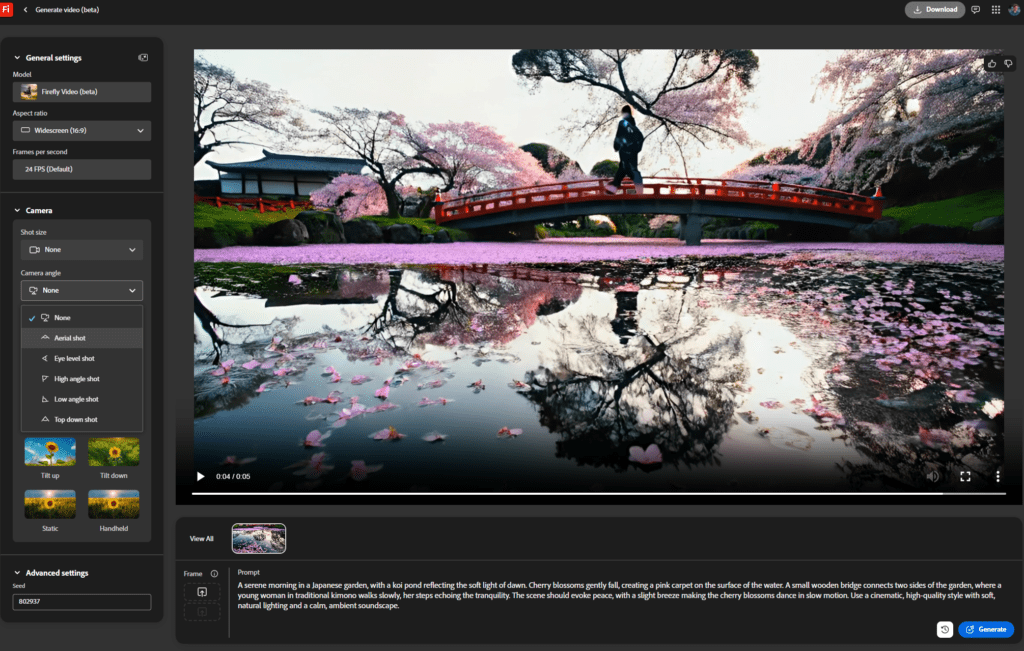**Adobe Firefly Launches Advanced Text-to-Video AI That Surpasses Sora**
We independently review everything we recommend. When you buy through our links, we may earn a commission which is paid directly to our Australia-based writers, editors, and support staff. Thank you for your support!

Brief Overview
- Adobe Firefly launches sophisticated text-to-video AI, competing with OpenAI’s Sora.
- Features precise creative controls, such as aspect ratio, camera perspectives, and movement presets.
- Currently accommodates 1080p resolution, with a 4K version under development.
- Restricted to 5-second clips, but anticipated to broaden in scope soon.
- Offered under Firefly Standard ($16.49 AUD/month) and Firefly Pro ($49.49 AUD/month) subscriptions.
- Generative credits set user limitations; free access is provided with certain constraints.
- Beta users cite high-quality video outputs, exceeding those from rivals.
Adobe Firefly’s Remarkable Advancement in AI Video Creation
Adobe has introduced an impressive new element to its AI suite—Firefly’s text-to-video creation. This innovative tool equips creative professionals with a simple way to produce high-quality videos by merely describing them through textual prompts. Numerous beta testers have already commended its effectiveness, with many making favorable comparisons to OpenAI’s Sora. Adobe’s AI-centric strategy seeks to redefine content generation while ensuring creative autonomy and protection of intellectual rights.
Notable Features and Creative Options
A distinctive feature of Adobe Firefly’s text-to-video AI is the extensive control it grants users. Unlike other text-to-video platforms, Firefly enables creators to adjust specifics such as:
Aspect Ratios and Resolutions
- Opt for traditional widescreen (16:9) or portrait (9:16) formats.
- Currently available in 1080p, with a 4K version anticipated.
Shot Sizes and Camera Perspectives
- Choose from various shot types, from extreme close-ups to wide shots.
- Modify camera angles including aerial, eye level, high angle, low angle, and top-down views.
Motion Settings
- Eight predefined motion settings, such as zooming in/out, panning side to side, tilting up/down, static, and handheld movements.
These sophisticated options empower creators with a directorial capacity, distinguishing Firefly from other AI video creation platforms.
What is the Cost of Adobe Firefly?
Adobe provides two subscription tiers for Firefly’s text-to-video AI, allowing users to choose based on their preferences:
- Firefly Standard: 2,000 video/audio credits each month, permitting up to 20 five-second 1080p video creations, at $16.49 AUD/month.
- Firefly Pro: 7,000 video/audio credits monthly, allowing up to 70 five-second 1080p video creations, at $49.49 AUD/month.
Free usage is available, albeit limited by generative credits. Current Adobe subscribers might already possess a credit allocation for generating text-to-video and text-to-image content.
Evaluating Adobe Firefly’s Video Output
Initial assessments of Firefly’s video production yield encouraging findings. Users indicate that producing a brief clip typically takes about a minute, with output quality significantly improving upon earlier AI video solutions.
In one test, a video of an Australian Cobberdog running in a backyard with a trampoline was generated. The outcome was impressively lifelike, surpassing similar efforts with OpenAI’s Sora.
Ok Adobe's Firefly text to Video AI is better than OpenAI's Sora. pic.twitter.com/ZPTbpHACRd
— techAU (@techAU) February 12, 2025
Conclusion
Adobe Firefly’s text-to-video AI represents an exciting milestone in AI-enhanced content creation. With its wide array of creative controls, superior output quality, and adaptable pricing, it stands as a strong contender against rivals like OpenAI’s Sora. While the current constraint to five-second clips is a limitation, prospective upgrades and the forthcoming 4K model indicate a promising future for this AI-driven tool.
Common Questions
Q: What distinguishes Adobe Firefly’s text-to-video AI?
A:
Firefly is remarkable for its sophisticated creative controls, such as aspect ratio choices, camera angles, motion settings, and shot dimensions. These capabilities enable users to create more refined and professional-quality videos than other text-to-video AI systems.
Q: What is the video generation time?
A:
Typically, Firefly needs about a minute to generate a five-second video. While this might be somewhat longer than some competitors, the quality of the outcome justifies the wait.
Q: Will Firefly allow longer video lengths in the future?
A:
Currently restricted to five-second clips, Firefly may eventually extend this limit as the technology progresses since it remains in beta.
Q: Is there a free option for Adobe Firefly?
A:
Indeed, Firefly has a free version, but usage is limited by generative credits. For more extensive capabilities, Adobe offers subscription plans with increased generation limits.
Q: How does Adobe Firefly compare to OpenAI’s Sora?
A:
A number of early users feel Firefly outshines Sora regarding video quality and creative controls. However, both tools are in a continual state of development, making direct comparisons subject to variation.
Q: Which industries could benefit from Firefly’s text-to-video AI?
A:
Firefly is well-suited for marketers, content creators, educators, and filmmakers in need of swift, high-quality visuals without incurring significant production expenses.
Q: Will Firefly be able to support 4K video shortly?
A:
Yes, Adobe has announced the ongoing development of a 4K model, aimed at offering even superior quality video generation.
Q: How does Firefly address intellectual property issues?
A:
Adobe has built Firefly as an IP-conscious AI solution, ensuring that generated content is suitable for both commercial and creative applications.
